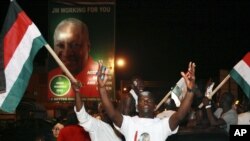Voting in Ghana's presidential and parliamentary elections has been extended by another day at some polling stations after technical problems prevented many people from casting their ballots.
Ghana's electoral commission said voting would continue through Saturday at polling stations where there were logistical problems with voter materials or the country's new biometric registration system.
This is the first election that Ghana has used the new system in which machines at the voting stations scan fingerprints to identify registered voters.
Ballot counting got underway Friday at polling stations where voting was completed.
Analysts are forecasting a tight race between the two main parties. President John Dramani Mahama is facing seven challengers, including main opposition candidate Nana Akufo-Addo.
Mahama of the National Democratic Congress took power in July after his predecessor, John Atta Mills, died of an illness. The 54-year-old has promised to create prosperity with large investments in infrastructure.
His challenger, Akufo-Addo, has campaigned on a promise to provide free senior high school education. The 68-year-old member of the New Patriotic Party narrowly lost to the late President Mills in 2008.
Ghana's 14 million registered voters also cast ballots for 275 members of parliament, where the NDC currently holds the majority.
Ahead of the vote, Kwadwo Sarfo-Kantanka, the deputy chairman of Ghana's Independent Electoral Commission, told VOA he expects the results will be out quickly.
"With the sort of equipment and system that we have in place, we are of the view that within 48 hours the results would be out," he said. "But definitely, within 72 hours."
The west African country has earned a reputation for stability in an often turbulent region because of its recent record of peaceful, democratic transfers of power. Following close elections in 2008, U.S. President Barack Obama called Ghana a "model of democracy in Africa."
Ghana, a nation of about 25 million people, is also one of Africa's fastest growing economies and is beginning to benefit from commercial oil production that began in 2010. The World Bank expects eight percent growth for 2012 and 2013.
But many residents, complaining of high living costs and low wages, say they now want more immediate benefits from the country's oil wealth, which is expected to grow rapidly in the coming years.
Ghana's electoral commission said voting would continue through Saturday at polling stations where there were logistical problems with voter materials or the country's new biometric registration system.
This is the first election that Ghana has used the new system in which machines at the voting stations scan fingerprints to identify registered voters.
Ghana's General Election
Ghana's General Election- President elected to a 4-year term
-
If no candidate wins more than 50%, a run-off election is held
December 28 - 275 Parliament members are elected to 4-year terms
- Members elected by simple majority in single-seat constituencies
- 14 million Ghanaians are eligible to vote
Analysts are forecasting a tight race between the two main parties. President John Dramani Mahama is facing seven challengers, including main opposition candidate Nana Akufo-Addo.
Mahama of the National Democratic Congress took power in July after his predecessor, John Atta Mills, died of an illness. The 54-year-old has promised to create prosperity with large investments in infrastructure.
His challenger, Akufo-Addo, has campaigned on a promise to provide free senior high school education. The 68-year-old member of the New Patriotic Party narrowly lost to the late President Mills in 2008.
Ghana's 14 million registered voters also cast ballots for 275 members of parliament, where the NDC currently holds the majority.
Ahead of the vote, Kwadwo Sarfo-Kantanka, the deputy chairman of Ghana's Independent Electoral Commission, told VOA he expects the results will be out quickly.
"With the sort of equipment and system that we have in place, we are of the view that within 48 hours the results would be out," he said. "But definitely, within 72 hours."
The west African country has earned a reputation for stability in an often turbulent region because of its recent record of peaceful, democratic transfers of power. Following close elections in 2008, U.S. President Barack Obama called Ghana a "model of democracy in Africa."
Ghana, a nation of about 25 million people, is also one of Africa's fastest growing economies and is beginning to benefit from commercial oil production that began in 2010. The World Bank expects eight percent growth for 2012 and 2013.
But many residents, complaining of high living costs and low wages, say they now want more immediate benefits from the country's oil wealth, which is expected to grow rapidly in the coming years.






